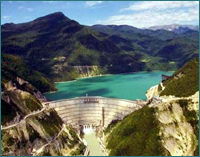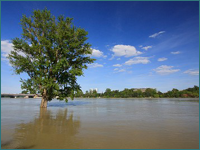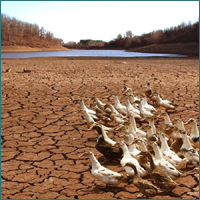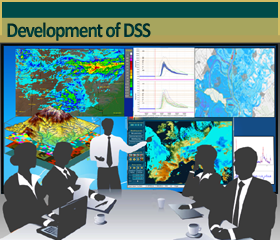|
|
The core business of the company is
hydroinformatics, which is a new and one of the most rapidly developing
fields of applied earth sciences. This technology is a new dimension of the
water science, driven by the advance of information technology for modelling
water management.
Over the years, the HYDROInform
has got extensive and deep experience in research activities in the area of:
Applied modelling and numerical simulation:
-
Statistically-based, lamped, physically-based and hybrid
mathematical modelling for water management and environmental
systems.
-
Data assimilation techniques for hydrological models.
-
Meteorological (precipitation, temperature) field analysis and
modelling, based on mathematical combination of raingauge and
radar rainfall estimates.
-
Stochastic weather generators.
Complex system modelling and simulation-based analysis:
-
Distributed, large-scale, high resolution hydrological
model-development. As a results of this activity, it has been
developed the large-scale high resolution distributed
hydrological model DIWA (DIstributed WAtershed) which is a
dynamic water-balance hydrological model that distributed both
in space and its parameters, and which was developed along
combined principles but its mostly based on physical
foundations.
-
Critical design value estimation.
-
Frequency and duration estimation of extreme hydrological
events.
Operations research: global, local and hybrid (deterministic and
stochastic) optimisation algorithms, and its application for:
-
Calibrating complicated mathematical models of water management.
-
Solving inverse problems of water design (e.g.: optimal
reservoir operation strategies, optimal planning of unregulated
– flow-through type – flood retention reservoirs, etc.).
HYDROInform has developed
numerous software solutions, applications and high level software
systems, especially for the purposes of hydroinformatics. Here some
of the most selected:
-
User-friendly, Windows based software system with fully
graphical user interface for DIWA (DIstributed WAtershed) model
with internal automatic calibration function. Over the years
they obtained a number of successfully experiences in using the
DIWA model, such as: real time forecasting, land-use change
influences on floods, real time drought-forecasting, flood and
drought-frequency analysis, impact assessment study of planned
flood retention reservoirs, and more.
-
On-line meteorological (precipitation, temperature) field
analysis and modelling based on a new technique which was
recently developed and introduced to combine raingauge and radar
rainfall estimates. It aims at obtaining rainfall estimates that
can be used as reliable inputs for hydrological models.
-
Stochastic weather generator for multisite generation of daily
sequences of meteorological data. The software can be used
successfully for a wide array of applications. This approach
became increasingly used in various research and engineering
topics, including frequency and duration analysis of extreme
hydrological events (flood, droughts, and water scarcity),
climate change and its influences on water resources,
design-value estimation for reservoirs or for river gauges, etc.
|





|






